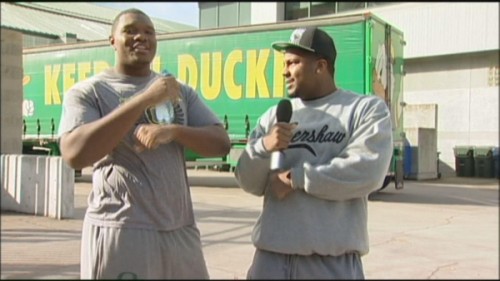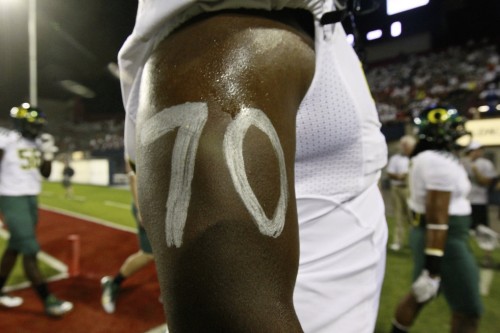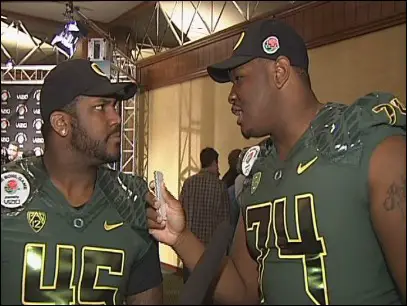“Once you fully understand your craft, that’s when you can truly move from average to good, and then from good to great.” 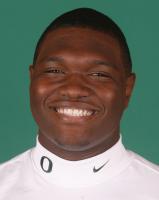
–Darrion Weems, Oregon Tackle (2007-2011)
Football glory, those moments when legends are made, are generally reserved for the “skill position” players; quarterbacks throwing for touchdowns, running-backs making long runs, and receivers reeling in athletic catches. All too often, spectators forget to notice that the only reason the speedsters and quarterbacks have the capacity to showcase their talents with 11 fast and strong defenders charging towards their team is because of the guys along the line blocking. It all starts up front with the hardest workers on the team: the Offensive Linemen, highly under-rated for all off their efforts, often mentioned only when flagged or missing a key block.
For the previous four years, Oregon’s Darrion Weems was a valuable key anchor in aiding the overwhelming success of the record-setting Oregon Offense. Weems joined Oregon in 2007, a blue-chip highly rated 4-star recruit from Woodland Hills, CA, part of the first recruiting class under then offensive coordinator Chip Kelly. Following a redshirt year in 2007, Weems saw playing time as a redshirt freshman against Utah State, Oregon State, and in the 2008 Holiday Bowl vs. Oklahoma State. Slowly but surely, he worked his way into the rotation as a backup, and eventually became a starter.
In 2009, Weems would backup Carson York but share time, rotating every two drives. Persistance paid off for Weems, eventuallly becoming a starter on Oregon’s offensive line; anchoring the vital left tackle position, protecting Darron Thomas’ blindside and sealing the edge for LaMichael’s jaw-dropping runs. Weems was an outright starter as a junior in 2010, and only injuries prevented him from starting every game (starting 7 games, including the national championship game.) As a senior in 2011, Weems started every game at Left Tackle.
Now having graduated from the University of Oregon and currently training for the upcoming NFL Draft, I had the chance to catch up with Weems to relive his glory days as a Duck and learn some of the little-known facts about his role at Oregon during the most successful run in school history.
-What schools were recruiting you, and what made you decide to be a Duck?
Pretty much the only school that didn’t recruit me that I wanted to go to was Miami. I got recruited by all of the big schools, and everyone on the west coast. The thing that set Oregon apart in why I came here was because of the people–the coaches. Coach Greatwood (Assistant Head Coach/Offensive Line Coach) is a great guy. I could tell when he was recruiting me that he was going to be a no-nonsense kind of guy. I had people calling me up and ‘selling me dreams’ and giving me all these wacky nicknames. But with Greatwood, the first conversation I had with him he told me straight it was going to be the hardest thing I ever did. But if I let him, he was going to turn me into a good player. I respected that about him, and the program.
I liked the feeling that I got when walk through the doors, that everyone is going to be here working hard, and all the players were great guys. A lot of places talk about their program being a family atmosphere, but go there and it’s the polar opposite of what that is! But here at Oregon, that truly is what it is; it’s everyone loving everybody, there’s no other nonsense. It’s us, a team. That’s ultimately why I came here.
-What are some of the differences in technique when playing tackle vs. being a guard?
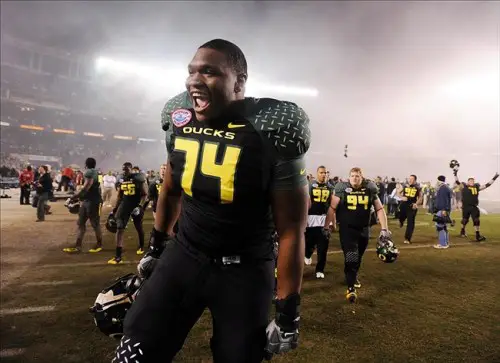 Being a tackle requires that you understand the offense a little bit more. You have to understand the way defenses work; the way they move, and the way they attack. You’re called upon (in the two-point stances) to see things; to see the blitz and alert others about the blitz, and all those things. The guards are in there too, and I don’t want to say they’re less-thinking/’grind it out’, but that’s more of their mindset. The guards are listening for the call from the tackles or from the center. They’re not actually making the calls or adjustments on their own, rather following our lead. That’s part of the difference between being a tackle and a guard, or even the center. The center runs the show; sets a blocking pattern before the play and then everyone kind of rolls of him.
Being a tackle requires that you understand the offense a little bit more. You have to understand the way defenses work; the way they move, and the way they attack. You’re called upon (in the two-point stances) to see things; to see the blitz and alert others about the blitz, and all those things. The guards are in there too, and I don’t want to say they’re less-thinking/’grind it out’, but that’s more of their mindset. The guards are listening for the call from the tackles or from the center. They’re not actually making the calls or adjustments on their own, rather following our lead. That’s part of the difference between being a tackle and a guard, or even the center. The center runs the show; sets a blocking pattern before the play and then everyone kind of rolls of him.
-How long did it take you to acclimate to Oregon’s system?
Early on, I was hard-headed. I didn’t work as hard as I should have; didn’t do all the things that I should have done early on to make it an easier process for me. For some reason, I wanted to make everything as absolutely hard as it could have been! So, at practice I wasn’t working as hard as I should have, or listening to Coach Greatwood as much as I should have; mostly for my first year and a half.

Chip Kelly shook a lot of people up.
When I really started getting it and getting better was when I started going to the film room on my own. I thought ‘let me just go and look at practice to see what I could do better.’ Nothing beyond that, I would go back and look at old clips of (Max) Unger and Fenuki (Tupou) and look at their old pass rush reps, or the way they did things in practice to imitate/emulate things they did. Once they left, Coach Kelly would have meetings. He asked me ‘who’s the hardest worker you’ve ever seen?’ I was like ‘Max Unger.’ He would respond, ‘what’s the difference between you and Max Unger, why can’t YOU be the hardest worker you’ve ever seen?’
That was kind of when I put it in my mind to work harder every day. It was partly Coach Kelly and the mindset that he brought to the program when he became the head coach. Every day, every practice, every meeting, and everything was going to be done to the best of my abilities.
The reason I came here was because of the type of guys they had in the program that would be like a big brother to you. Guys like Max Unger, Fenuki Tu’Pou… even the defensive guys like Rashon “Sonny” Harris; he was a guy I learned to work hard from, and his off-season workouts and how he attacked them. A whole bunch of other guys too, like Dennis (Dixon) were always trying to help out. I remember talking to him my freshman year and him telling me about all the little things to help grow and blossom as both a person and a player. That’s part of the reason I came, and I’m glad I was an offensive lineman.
The guys I was in my meeting room with were more my fit as opposed to being in a room with receivers or DB’s. It was a different experience for me, I was the only black guy in there for a couple years, and I learned from those guys how to grow up. I learned how to grow, the importance of school, the way you’re supposed to act and carry yourself. From that mold, I carried it with me and used the things they gave me, and passed that knowledge back to the young guys when I was a junior-senior. Eventually, I developed enough understanding of the system, I didn’t have to hear the play call to know what was happening. Once you fully understand your craft, that’s when you can truly move on from average to good; then from good to great.
-How did Coach Greatwood help you become a better player? Did it help that he too played offensive line at the University of Oregon, so he knew exactly what you were going through from your perspective?
Having him as my coach, he put that mindset in the offensive line room that academics are important, and working hard is key. Every year, he molds the offensive linemen into great players, no matter what he’s given. He always makes the best out of every situation, he maximizes everyone’s potential.
As far as him playing at Oregon, he played here at a different time! He always jokes around with us about how he didn’t win as many games, and it wasn’t the same kind of atmosphere back then…You’d have to ask him about those things and his playing days. But, he really knows what we’re going through and can relate. All around, a great coach and great guy; and he made things happen.
-Oregon is known for doing things different, and nobody personifies that better than Strength & Conditioning Coach Jim Radcliffe. Not only is he a great coach, but a unique and well-respected individual. Everyone has a Jimmy Radcliffe story, what’s yours?
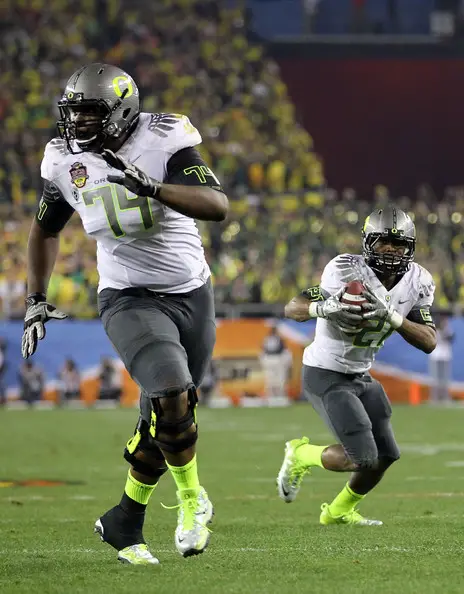 I remember the first time we were working out, fall of 2007. We were all just freshmen and messing around and not focusing on workouts like we should have. All of a sudden, Coach Rad just jumps up on this ledge. I don’t know how he did it, but he either jumped or crawled up this wall behind us, and is just standing there watching us. When we’re messing around, we weren’t expecting someone to jump on this huge wall ten feet off the ground, and then climb the gate another three feet! But Coach Rad did that, and then while standing up top he was like, ‘GENTLEMEN?!‘ (in a funny voice.)
I remember the first time we were working out, fall of 2007. We were all just freshmen and messing around and not focusing on workouts like we should have. All of a sudden, Coach Rad just jumps up on this ledge. I don’t know how he did it, but he either jumped or crawled up this wall behind us, and is just standing there watching us. When we’re messing around, we weren’t expecting someone to jump on this huge wall ten feet off the ground, and then climb the gate another three feet! But Coach Rad did that, and then while standing up top he was like, ‘GENTLEMEN?!‘ (in a funny voice.)
Then we all turned around, and were like ‘what the heck?!’ He got our attention and stopped us from messing around. We were looking ahead of us, and then suddenly there he was behind and above us! We all looked up at him, and then everyone got our focus back on our routine. That’s the kind of guy he was, so funny, I love him a lot. He is the heartbeat of this place, if you ask anybody about who is THE most important person in Oregon Football; they’ll say Jim Radcliffe.
-It can’t be all serious focused on football all the time, so who was the biggest joker or clown on the team keeping the mood light and positive?
Terrell Turner!!! If you asked anyone the biggest joker they’ve ever been around, they’d say Terrell Turner, it’s just everything…He’s my best friend. We’d be in the locker room joking and clowning around; he was always one of the guys I spent the majority of my time off the field with. It’s funny, because we were the greatest of friends; but we were also competitors. Every time we would get onto the field, we’d get at it. I had more fights with Terrell at practice than anyone! I was always yelling, cursing, rough blocking/punching when going at it; but it’s all love. After practice, it’s all good, and that’s the way it’s supposed to be.
As for a specific funny moment…man, ALL THE TIME, it just never ended! If you’re around him 24 hours a day, 23 of them are going to be hilarious. In that locker room, when we weren’t practicing and/or it wasn’t a serious deal; guys were always joking around, it was constant. We were always in that locker room having a good time, just a constant frenzy joking around.
-Do you recall any particular times when some opponent was really trash-talking throughout the game, and you managed to shut them up?
Our pace of play kind of limited the amount of trash-talking people could do! Most of the time, guys were sucking air just trying to keep up with us. I remember the time we played Tennessee, one guy wasn’t talking trash but during the game he said, ‘If you guys don’t slow down, I’m gonna throw up all over myself!‘ For the most part, we would get up on guys so quick and so early, we’d be moving so fast they didn’t even know what hit them. By the time they were warm and in the gist of the game, they had to focus more on climbing back into it. So, our pace often prevented trash-talking. (the scoreboard in most games helped too)
-If there was a particular opponent or game(s) you would like to get another shot at if you could, which one would it be?
For some reason, I never played the Washington State Cougars well. I played a terrible game every time we went against them. My best games I felt were this past year, I had a couple really good ones this year (2011). Against Washington, we played very well as a unit. Being an offensive lineman, you can’t have a solo good game. You’re game isn’t good unless the whole offensive line does well. Washington, we played really well; against USC was the best grading sheet I’ve seen (even though we lost), and Stanford we played very well. We had a bunch of games this year where we just got it, understood it, and were very physical. You could just kind of sense that was the way the offensive line position is supposed to be played.
The game I’ll always remember though is LSU to open the season. That was the most fun I’ve ever had playing football, even though we lost the game. It meant a lot to me; I played really hard and I was excited, having grown up in Louisiana. I was a LSU fan as a kid, and that was one of the few games I got to play in in front of my family. All the right things fell into place and made that one a memorable game for me. Me and Ramsen (Golpashin) always joke about playing in it together. Ramsen got hurt a week later, and that was all he had; but I enjoyed that time playing next to Ramsen in that game, as he’s someone I’m really close with.
The play I am most proud of happened at the beginning of the (2011) Washington game. When LaMichael ran for the first touchdown against Washington for about 20 yards, I took a guy and drove him probably 40 yards into a camera on the sidelines! That’s probably the play I’m the most proud of from my career.
-What was it like stepping onto the field for your first college game?
The first game I ever played in that meant anything was the Boise State game (2009). The first game I ever played in was Utah State (2008), but only after we were killing them. The Boise game was the first game that would have significance for me, where everything I did dictated whether we won or lost. To this day, I think that’s the loudest stadium I’ve ever been in. It was crazy and intense, and the first time I was ever out there. Me, Carson, and the whole offensive line were relatively fresh. For that first game to be at Boise was crazy and intense in its own right.
-How about your life in Eugene outside of football, what was that like?
I was just like any college kid. I did a little bit of partying, mostly with my teammates. I kind of regretted it, but I never really hung out with other people on campus like I probably should have. I wish I had just taken in the whole college experience and had non-athlete friends. But, the majority of what I did was with my team and involving my team; waking up in the morning, call Terrell and say ‘what-chu doin today?!’ Just things like that, there was never a time I went out or did something and wasn’t with a teammate, and that’s kind of the way it went – when I hung out I did so with my team; when I went places, I went with my team; when I enjoyed things, I enjoyed it with my team.
We all went to all those places for college students: Rennie’s, Taylor’s, The Original Pancake House, etc., all of those places everyone else goes to, you go to also. After the game, if we lost I was at home usually. But if we won (which we did a lot) I would go to wherever my teammates would be (Taylor’s, Jogger’s, etc.).
-Aside from your collegiate career on the field, what did you do to better yourself away from the gridiron? Were you involved in the O-Heroes program or other community opportunities?
I did all sorts of things. James Harris (team nutritionist) had me do extra activities, such as join the O-Heroes Program (student-athletes providing community service). There was a boy named Alex who came to a bunch of practices and hit me up on Facebook religiously, it seemed like every time I logged on, I would get a message from him. His dad asked me to coach his basketball team, and I did.
I did a lot of low-key things through the O-Heroes Program. I went to schools, spoke to classes, read to kids, etc. I also did a bunch of stuff when I just went out on my own to make things happen. Any time someone would message me on Facebook, I was down to go and meet people to do things like meet kids and speak to them. I think that’s one of the things I’m happiest about with my career here.
Jamesha Youngblood (track athlete) had a game called ‘Are You Smarter Than a FOURTH Grader?,’ she took me, Terrell, a few track girls, and basketball players to a school. We all jumped in the car, not knowing what to expect when we walked into a gymnasium full of kids. We went only thinking we’d speak to a classroom and joke around with a few kids, but they were serious about it! They wanted to meet us bad. They were so smart, we underestimated how much a typical fourth-grader knows. I remember Terrell joking around, and misspelled an easy word, and we all laughed at him; the kids loved it. Just things like that were awesome.
-What are the most vivid memories, the most cherished times, and the things you will take with you from your recently completed career at Oregon?
Coach Greatwood shaped me not only as a player, but as a man. He helped me understand and utilize my potential as a student and athlete. I always had confidence about myself, but he helped me use it in the right ways. The way I display myself and put it all out there is because of things I’ve learned the last couple of years, and the way I interact with people too. I always was a nice/polite kid, but I find it so easy to just connect with everyone now. You can be a five year-old kid or 80 year-old woman; I find it easy to connect with all of these people.
That’s part of the experience Oregon has going; fans stopping you in the grocery store and talking with you about their favorite Duck moments, giving you their interactions with Oregon Football is huge. I met a lady in the grocery store a few years back, and she told me how she had classes with Ahmad Rashad, and her husband played with him. Another man was a non-traditional returning student in my class who would always talk to me about random things. That was what was important to me – the people you meet, friends you make, fan support, etc. That is truly what will transcend in these four-five years. Sooner or later you’ll forget the specifics of the plays you made, the games, or the seasons. It will all become a blur, but I’ll always have the friends I made here. Terrell, Ramsen, Carson; those guys I’ll know forever, and that’s what is important to me about the whole deal–the people!
As you move on from Eugene, is there anything you want fans to know about you and your time here at Oregon?
The reason I came here is because the fans were awesome, I knew it was going to be an awesome deal in Eugene (escape from city life), and it truly was. I’ll miss it, but it’s just the cycle, you get five years here and just have to enjoy it while it’s with you. I just want to the fans to know how big of an impact that they can have on a young man like myself. Like I said, being in the grocery store and speaking to all sorts of people from young kids to old ladies just made an impact not only on the way a player perceives the world around him but his own grown and maturation process as well. Just continue to be awesome, Duck fans!
-You got to go out as a champion, being part of the team that brought the Rose Bowl trophy home to Eugene for the first time in 95 years. What have you done since winning the Rose Bowl, and what do you hope to do from here?
I’ve been preparing hard for the NFL draft. I was in New Orleans last week visiting the Saints. I’ve been getting a lot of calls/text messages from teams and scouts, so I’m really excited about my future and the prospect of playing professionally moving forward. I just can’t wait to get out there and do that, whether I make it or not but just try it and make my family proud. I want to make the university proud, given that from here on out, I’ll always be a Duck!
Whatever I do, it will have that Oregon tab on it. So if I go out and play 15 years in the NFL, it’s going to be ‘Darrion Weems, University of Oregon.’ If I go out and become the founder of an organization that ends up becoming the hugest thing in the world, it’s going to be ‘Darrion Weems, University of Oregon.’ It’s about going out and making family and university fans proud. Those are my goals, I want to be able to look back and say that my years at Oregon were great – but not my best years. I want to go out and see places, do things, and accomplish a lot more.
Darrion Weems Today:
Weems, 23, is now a successful college graduate on his way to a potentially promising future. His ultimate goal is to play in the NFL, but that never lasts a lifetime. Whether he has a short or long-term NFL career, Weems wishes to give back. A strong advocate for helping others in need, Weems wishes to work with non-profit organizations to improve humanity wherever he may choose to permanently locate.
“There’s a lot for me to do in the world, I want to work in non-profit with youth and foster kids. My grandfather owns a non-profit organization, and just randomly asked me to be on his board of directors. I don’t have much experience as of now, but I’ll definitely do it for the experience because those are the types of things I want to get into. Whatever I can do to help those around me, that’s what I’m going to do. I love people, I love human interaction, and I can’t stand to see people struggle; it’s like my weakness in the world! That, and a good chocolate chip cookie!!”
Just like former Oregon great stalwarts have started non-profit organizations for children/youth sports and development (The Anthony Newman Foundation, Kenny Wheaton Foundation, Saul Patu Foundation, Ryan DePalo’s Oregon Football Association); Darrion Weems’ success on the field and education at the University of Oregon appears to have him headed in the right direction for another organization to come. Meanwhile, any true Duck eagerly awaits the NFL draft to see where Weems and many other potential draftees will end up playing on Sundays.
*We at FishDuck would like to thank the University of Oregon Athletic Department in providing their assistance in facilitating this and other interviews with current and former student-athletes.
These are articles where the writer left and for some reason did not want his/her name on it any longer or went sideways of our rules–so we assigned it to “staff.” We are grateful to all the writers who contributed to the site through these articles.

